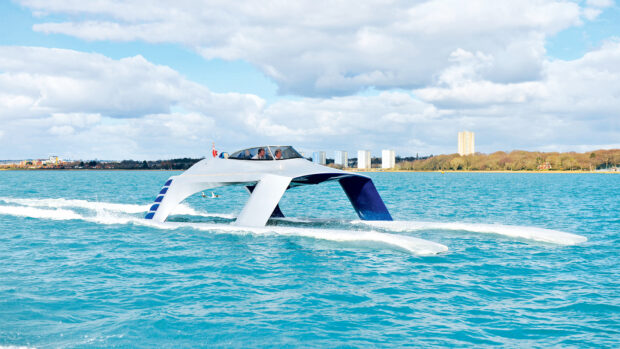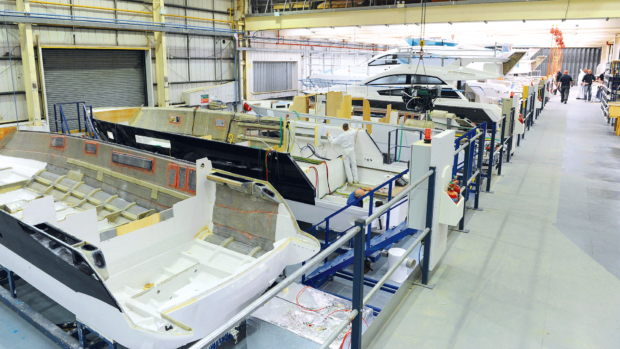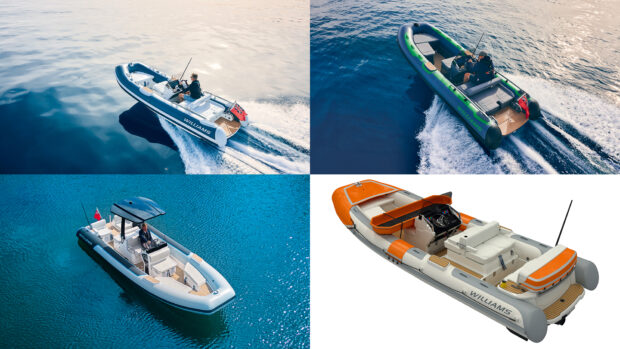In his ongoing quest to find the ultimate boat toy editor Hugo tries his hand at the new sport of eFoiling and explains how to eFoil…
The 19th century English poet Arnold Bax rarely features on MBY.com but he is the person credited with coining the phrase, “You should try anything once except incest
and folk dancing.” I can think of one or two other things I’d add to the list, but on the whole I agree with his admirably open-minded stance.
Which explains why I now find myself strapped into a snug-fitting impact vest and helmet looking like I’m about to head out on patrol in Helmand Province rather than being taught how to use the latest must-have boat toy.
This wasn’t how I envisaged learning how to eFoil. The YouTube videos and brochure images invariably show lithe young things, wearing little more than tans, skimming effortlessly over tropical waters as blue and sparkly as their eyes.
I am 53, pale as a potato and wearing a short-sleeved wetsuit tight enough to act as a male contraceptive. It doesn’t help that the rather bleak surroundings of Portland Harbour look pretty uninviting at the best of times, let alone on an overcast and worryingly breezy day. That said, it does share certain characteristics with my eyes – being cold, grey and watery.
The poor soul tasked with trying to teach this middle-aged ingrate how to e-foil is Joe Adams, a cheery young instructor from OTC Watersports who’s probably never seen a camera film, let alone a cassette tape.
Article continues below…

Kawasaki SX-R review: Stand-up Jet Ski delivers extreme performance
£10899

Best boating water toys: 12 ways to make your boat even more fun
To make his life even harder I’ve brought along my brother, Tobyn, a couple of years younger than me but – how can I put this unkindly – built for comfort rather than speed.
If Joe can succeed in getting either of us standing on one of his electric flying planks within our two-hour lesson, he is either a god among teachers or e-foiling is better suited to boat owners of a certain age and weight than either of us had realised.
Which eFoil board to choose?
The first thing we have to do is select our weapon of choice. OTC Watersports is an authorised dealer for Fliteboard, the Australian manufacturer of electric foil boards that British convert (and Axopar 28 owner) Rob Wylie used to cross the English Channel last year.
We could either go for a similar model to the one he used that’s made from carbon fibre and aluminium and has a terrifying top speed of 30 knots but only 100 litres of buoyancy. Or we could opt for the inflatable Air model, which looks more like a tiny SUP and has 150 litres of buoyancy.
Since I have no intention of going anywhere near 30 knots and don’t fancy being turned into Sushi by that disturbingly sharp looking foil, I opt for the big, bouncy one.
While I stagger down the harbour’s broad and very slippery concrete slipway trying not to drop £10,000 worth of Fliteboard weighing the best part of 25kg, Joe and Tobyn scoot off to collect the school’s coaching RIB.

Hugo in full body armour meets his nemesis – the Fliteboard Air
There’s a bit of faffing about while we check that the intercom between the boat and my helmet earpiece is working correctly. Joe needs to be able to talk me calmly through the learning process, and I need to be able to swear back at him. Copiously!
How do eFoil boards work?
In theory it all sounds quite simple. First you have to sync the remote control throttle (which looks like a 1980s Scalextric handset) to the board by holding it against a little docking station, then slowly pull the trigger to activate the drive.
Once you’re moving you can shift up through the gears (the latest model has 20 of them!) using a thumb-operated button. Steering is simply a matter of tilting the board right or left, much like a surf or wakeboard. That’s the easy bit, the trickier part is learning to get it ‘flying’ on the foil.

Once you’ve got the hang of lying and kneeling on the board you can progress to standing up and trying your luck at foiling – or falling!
In theory, you just need to build up to take-off speed in third or fourth gear, shift your weight back a bit so that the foil starts to generate lift and, hey presto, you’ll soon be racking up frequent flyer points faster than Richard Branson.
The good news is that you don’t have to start standing up, for the first few minutes I just lie on the board getting used to the speed while swallowing half the English Channel thanks to the wind-assisted spray jet-washing my face.
Joe has decided to take us right out to the largely unoccupied far side of the harbour, presumably to reduce the chance of us damaging other water users, not to mention his credibility.

By the time we get there I’ve already clambered onto my knees and started scrolling through the gears, if only to stop my face being eroded back to the bone.
Now’s the time to raise the stakes and the ride height by leaning back just a little. Woah there!
The board rears up like an angry stallion and in an effort to stop myself being deposited off the back, I shift my weight forward again, instantly causing the board to nosedive and depositing me head first into the drink. Fliteboard 1: Editor 0.

Having rinsed and repeated the above five or six times, I finally start to get the hang of foiling on my knees and decide to risk standing up.
Much to my relief the standing part isn’t as hard as it sounds, perhaps because I’m a passable waterskier/windsurfer.

But inevitably as soon as I try to get up on the foil it results in the same dunking. Only this time I fall off the side, flat on my back.
So that’s why they insist on an impact vest for learners, without it my kidneys would be as bruised and swollen as a pair of aubergines.

After several more attempts I manage to get foiling long enough to start to enjoy it but not long enough to master a turn and carve triumphantly past the boat for the camera.
Cold, exhausted and slightly deflated, I kneel-board back to the boat and let my brother have a turn.
After a few tries he’s bombing about on his knees like a human torpedo (which might explain the rusting hulk of a military ship behind us), but is still no closer to mastering sustained flight than the emperor penguin he resembles in his wetsuit.

Amazing grace
Determined not to be defeated, I jump back in the water for a final attempt on the journey back to base. As if by magic, it all comes together and for a few glorious minutes I am flying above the water on the closest thing yet to a working hoverboard.

On his 87th attempt Hugo finally manages to stay foiling long enough for a photograph
It is an utterly intoxicating sensation; fast, silent, effortless, graceful and exhilarating. I can honestly say that learning how to eFoil was the most fun I have had standing up in years.
It turns out that learning how to eFoil isn’t that hard after all and old sea dogs really can learn new tricks. If you are looking for a new water toy to keep on your boat, are reasonably fit and enjoy a challenge, I would highly recommend it – over and above such proven winners as stand-up jet-skis and Seabobs.
Dizzy with excitement I hold my hands aloft in triumph. And fall arse first into the water. Again.

Fliteboard specifications
Weight: 25kg
Power: 2.2 kWh
Volume: 150 litres
Speed: 29.7 knots
Endurance: 2hrs
Price: €10,720
My specifications
Weight: Sufficient
Power: Insufficient
Volume: 6-7 pints
Speed: No thank you
Endurance: Until I get hungry. Or cold.
Price: 1 good lunch
Fliteboard eFoil lessons start from £149. For more information, visit otc-watersports.com or call +44(0)1305 230296.
First published in the April 2022 issue of MBY.

E-foiler and Axopar 28 owner Rob Wylie crossed the Channel on a Fliteboard

Expectation…











